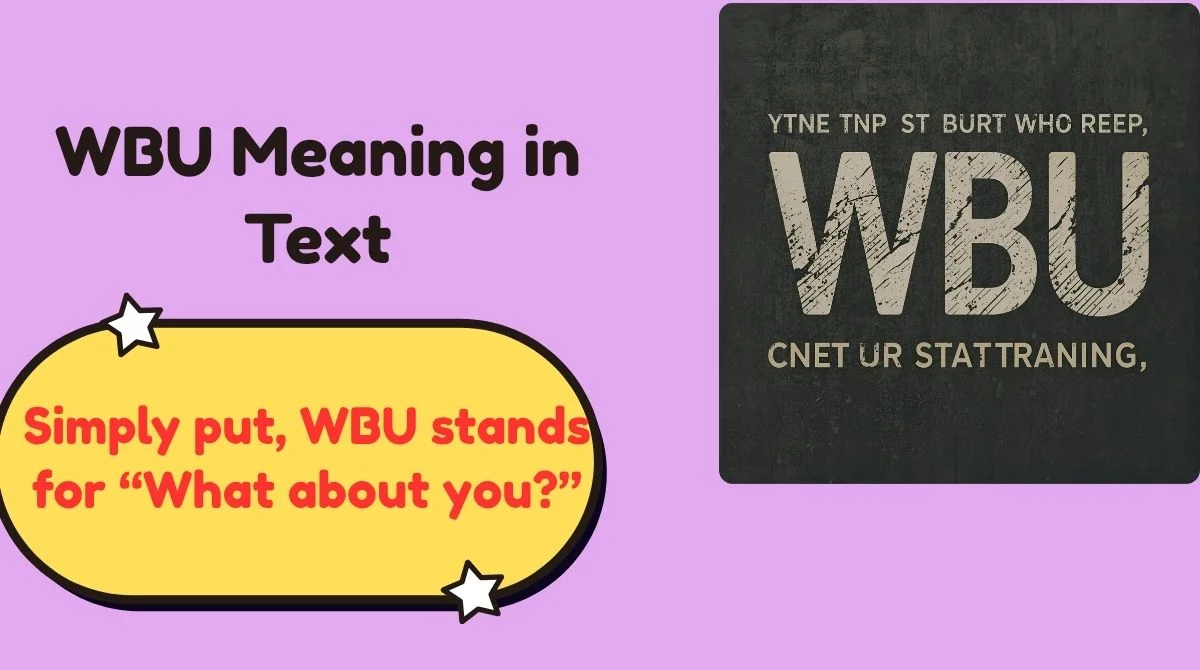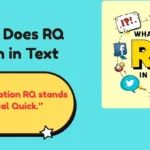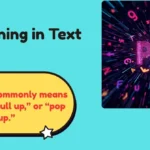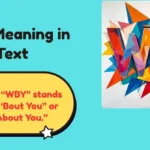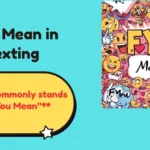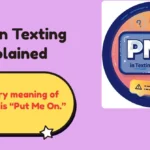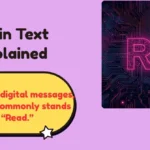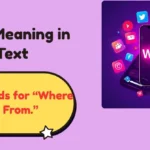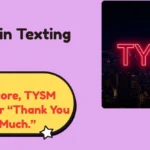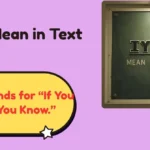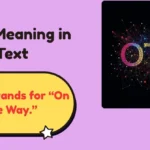If you’ve ever seen someone text you “WBU?” and found yourself staring at the screen wondering what it means, you’re not alone.
This tiny acronym has become one of the most common phrases in online chats, social media, and texting. But what does WBU mean in text, and when should (or shouldn’t) you use it?
In this detailed guide, you’ll learn not only the WBU meaning, but also real-life examples, alternatives, common mistakes, and how to use it in a natural, confident way across different contexts.
Let’s dive in 👇
🗣️ What Does “WBU” Mean in Text?
Simply put, WBU stands for “What about you?”
It’s a casual abbreviation that people use in texting and online conversations when they want to return a question or keep a chat going.
✅ Example:
“I’m heading out for dinner. WBU?”
Translation: “I’m heading out for dinner. What about you?”
It’s often used when someone shares a piece of information and wants to hear your side too.
Tone: friendly, informal, and conversational.
Part of speech: phrase abbreviation.
Used by: teens, young adults, and pretty much anyone who texts regularly.
🧩 Origin of “WBU”
The term “WBU” started showing up in online chatrooms and SMS texting during the early 2000s, back when character limits were tight. Abbreviations like LOL, BRB, HBU, and WBU helped people save time (and thumb effort).
Today, it’s deeply rooted in digital slang culture, used worldwide in WhatsApp, Snapchat, Instagram, Discord, and even casual emails between friends.
📱 Example Uses of “WBU” in Real Conversations
Let’s see how WBU appears across different situations and platforms.
💬 Text Message Examples
- “I’m bored at home. WBU?”
- “Just finished my shift. WBU tonight?”
- “I’m craving pizza. WBU?”
🌐 Social Media Examples
- Instagram comment: “Loving this vibe 😍 WBU?”
- Twitter/X post: “Feeling productive today. WBU all?”
- Reddit reply: “Working from home since Monday. WBU guys?”
💻 Chatroom or App Examples
- Discord: “I’m grinding on this game. WBU?”
- Snapchat: “Just got back from class. WBU?”
In short: It’s a versatile abbreviation that works whenever you want to flip a question back naturally.
🎭 The Tone Behind “WBU”
Tone is everything in digital communication. The way “WBU” comes across depends on context, punctuation, and relationship with the person you’re talking to.
💡 Friendly Tone
Used with emojis or casual words.
“Just chilling 😎 WBU?”
💼 Neutral or Polite Tone
Used in slightly formal or unknown settings.
“I’m wrapping up my tasks, WBU?”
😐 Cold or Dismissive Tone
When used alone or without context, it might sound distant.
“WBU?”
In this form, it can seem like you’re not interested or just replying out of habit.
🚫 When Not to Use “WBU”
Although it’s super common, there are times when using WBU isn’t appropriate.
❌ Professional Communication
Avoid using it in emails or workplace chats, especially when talking to clients, managers, or older colleagues.
Use a more professional alternative like “What are your thoughts?” or “How about your perspective?”
❌ Formal Events or Invitations
If you’re writing an RSVP, thank-you note, or formal message, WBU will sound too casual.
❌ Older Generations or Non-Tech Savvy Recipients
They might not understand what WBU means, which can lead to confusion.
❌ Sensitive Conversations
When someone opens up emotionally, WBU can sound dismissive or rushed. For instance:
“I’m really struggling today.”
“Oh. WBU?” ❌
Instead, offer empathy before asking about them.
🧍♂️ Synonyms & Alternatives to “WBU” (By Tone and Context)
Sometimes, WBU doesn’t fit the tone or formality of a message. Here are better alternatives organized by how formal or casual you want to sound.
🗣️ Casual & Friendly Alternatives
Perfect for texting friends or peers.
- “How about you?” – Most common replacement.
- “What’s up with you?”
- “What are you doing?”
- “Your turn—what’s going on?”
- “What’s happening with you?”
💬 Polite or Neutral Options
Best for acquaintances or semi-formal situations.
- “What are your thoughts?”
- “And yourself?”
- “Do you feel the same?”
- “What’s your opinion?”
- “Let’s hear your side.”
💼 Professional or Formal Choices
Useful in workplace chats, client emails, or academic settings.
- “May I ask how you’re doing?”
- “What do you make of it?”
- “What’s your perspective on this?”
- “Would you like to share your input?”
💡 Why Choosing Better Alternatives Matters
Choosing the right words isn’t just about grammar — it’s about connection and clarity.
Here’s why it matters:
- Tone shapes perception. Using WBU in the wrong setting can make you sound careless or too casual.
- Professionalism counts. Employers and clients appreciate clear, thoughtful communication.
- Cultural understanding. Not everyone interprets slang the same way; clarity avoids confusion.
- Respect builds rapport. A simple “What are your thoughts?” can come across as considerate and engaging.
💬 Pro Tip: The best communicators adjust their tone to fit the audience — just like changing outfits for different occasions.
🎯 How to Pick the Right “WBU” Alternative (With Real Scenarios)
Let’s see how this works in real conversations.
💌 Texting a Friend
Keep it short, fun, and conversational.
“Just finished watching a movie. WBU?”
or
“I’m grabbing coffee ☕️ What about you?”
Friends expect relaxed, emoji-filled chats — WBU works perfectly here.
🧑💼 Replying to a Coworker or Client
Professional spaces demand clearer and more polished language.
“I think this design works well. What are your thoughts?”
“I’ve attached the report. Would love your input.”
Avoid abbreviations here to maintain professionalism.
👥 Chatting in a Group
When you’re in a group chat or online thread, keep it inclusive.
“I love that idea! What do you all think?”
“I’m in. Any thoughts from your side?”
⚠️ Common Mistakes to Avoid When Using “WBU”
Even though it’s a small word, people often misuse WBU. Here are the top pitfalls:
| Mistake | Why It’s a Problem | Better Choice |
|---|---|---|
| Using “WBU” in business emails | Sounds too casual | “What are your thoughts?” |
| Sending it as a one-word reply | Feels cold or uninterested | Add context or emojis |
| Mixing it with emotional messages | May seem insensitive | Show empathy first |
| Overusing in every message | Becomes repetitive | Switch to alternatives |
🔁 “WBU” vs. Similar Slang Terms
WBU isn’t the only way people ask about someone else. Let’s compare it with other popular abbreviations.
| Slang | Meaning | Tone | Common Use |
|---|---|---|---|
| WBU | What about you? | Friendly | Text, casual chat |
| HBU | How about you? | Slightly more polite | DMs, comments |
| SUP | What’s up? | Very casual | Friends only |
| LMK | Let me know | Informal | Quick responses |
| HRU | How are you? | Friendly | Intro to conversations |
👉 Key Difference:
- HBU often sounds a bit softer and slightly more polite.
- WBU feels direct and conversational.
📊 Quick Guide: “WBU” Across Different Platforms
| Platform | Appropriate Use | Example | Professional? |
|---|---|---|---|
| Comments, captions | “Just chilling 😎 WBU?” | ❌ | |
| Snapchat | Casual convos | “On my way home, WBU?” | ❌ |
| Discord | Gaming or community chat | “Grinding tonight, WBU?” | ❌ |
| Not suitable | Use “What are your thoughts?” | ✅ | |
| Friends/family | “I’m done for today. WBU?” | ✅/❌ (depends on chat) |
📚 Case Study: Why “WBU” Works for Some but Not All
Let’s take two texting examples to see how context changes everything.
Case 1: Friendly Chat
Alex: “I’m thinking of grabbing sushi.”
Mia: “Yum! WBU?”
👉 Feels warm and engaging. Keeps the flow natural.
Case 2: Professional Email
Alex: “I completed the proposal draft. WBU?”
👉 Feels abrupt and unprofessional.
Better alternative:
“I’ve finished my section of the proposal. What’s your progress so far?”
Lesson: Always match the tone of your environment.
🧠 Fun Fact: The Psychology of Short Texts
Linguists say that abbreviations like WBU, LOL, and TTYL serve as “digital empathy markers.”
They mimic natural speech rhythm — short, punchy, and emotional.
“Text slang allows people to communicate emotion faster,” says language expert Dr. Naomi Baron.
That’s why phrases like WBU feel personal despite being short — they create connection through familiarity.
🤔 FAQs About “WBU” Meaning in Text
What does “WBU” mean in a text message?
It means “What about you?” — a friendly way to return a question or ask someone how they are or what they’re doing.
Is “WBU” formal or informal?
It’s informal. Best used in casual chats with friends or peers, not in professional settings.
Can I use “WBU” on social media?
Absolutely. It fits perfectly in comments, captions, or replies. Just remember your tone — use emojis if needed.
What’s the difference between “HBU” and “WBU”?
Both mean almost the same. HBU = “How about you?” sounds a bit more polite, while WBU = “What about you?” feels slightly more direct.
Should I use “WBU” in work emails?
No. Replace it with professional options like “What are your thoughts?” or “What’s your perspective?”
🏁 Wrap-Up
Language evolves, and WBU is proof of that. It’s short, friendly, and practical — a digital reflection of how we speak in real life. But like all slang, it’s not one-size-fits-all.
When texting friends or chatting online, it adds warmth and flow. Yet in formal or emotional contexts, a thoughtful alternative says more about your awareness and respect.
💡 Final Tip: Let your tone match your intention. Whether it’s WBU or What are your thoughts, the goal is connection — not confusion.
So next time someone texts you “WBU?”, you’ll not only know what it means — you’ll know how to use it like a pro.
